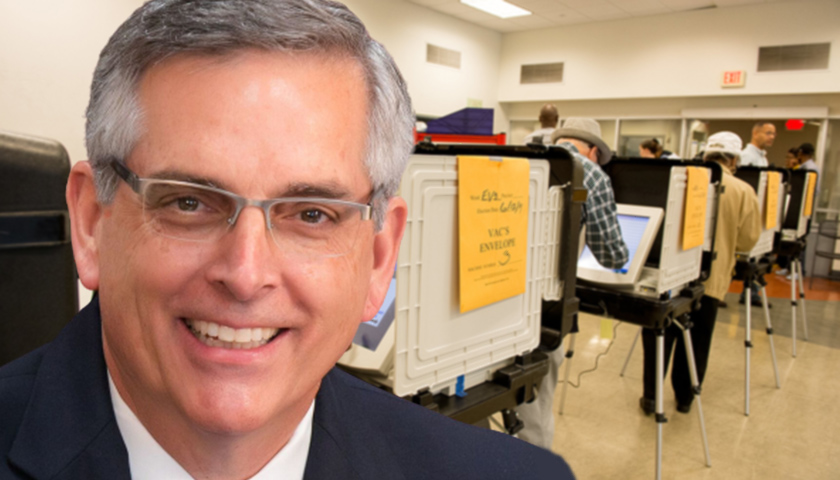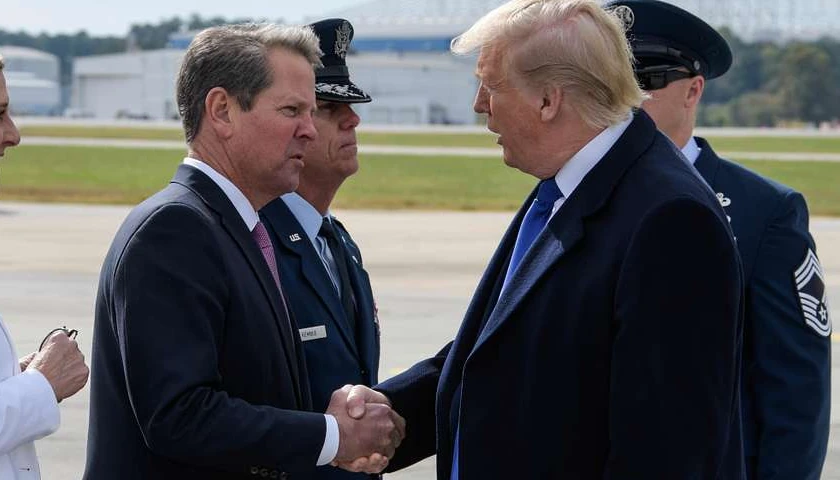On Tuesday the Washington, D.C.-based American Enterprise Institute (AEI) failed to pose two important questions to Georgia Secretary of State Brad Raffensperger about the November 2020 presidential election and missing ballot transfer forms.
AEI officials Tuesday afternoon livestreamed a question-and-answer session with Raffensperger about how to restore public trust in voting.
AEI scholar John C. Fortier asked a few of the 10 questions that The Georgia Star News submitted Tuesday morning. Fortier did not, however, ask two of our most crucial questions.
Why did Raffensperger fail to produce ballot transfer forms documenting the chain of custody for all of the estimated 600,000 absentee vote-by-mail ballots deposited in drop boxes in the November 2020 election for public review and inspection?
And do certain of Raffensperger’s past actions in office engender voter confidence in last November’s elections?
As reported earlier this month, chain of custody documents have not been produced by state or county officials for 355,000 absentee vote-by-mail ballots deposited in drop boxes in the November 2020 election.
Also, The Georgia Star News, through an open records request to Cobb County for ballot transfer forms, documented the following as it pertains to the November 2020 election: Exactly 78 percent of the 89,000 absentee vote-by-mail ballots deposited in drop boxes in Cobb County were not delivered “immediately” –defining “immediately” as one hour or less–from the drop boxes to the county registrar as the July 2020 Emergency Election Code Rule required.
‘We Never Signed a Consent Agreement’
Raffensperger, at one point, said the following about chain of custody ballots:
“We have established chain of custody for every county in Georgia except three, and they were three smaller counties that represented .03 percent of the total vote count,” Raffensperger said.
“And they’ll be sanctioned and brought before the state election board for prosecution. But the large counties Fulton, Gwinnett, Cobb, DeKalb — all the large metro counties — have established full chain-of-custody and given us documentation on that. That is a powerful point that people need to be aware of.”
Fortier later asked Raffensperger about his office accepting $5.6 million from the Mark Zuckerberg-funded Center for Election Innovation and Research.
Raffensperger said that, historically, county election officials felt they had either had too tight of a budget or that state officials had underfunded them.
“We had private sources of funding that came during the pandemic with COVID. One of the challenges we saw in Georgia was that the bigger counties had people who were grant writers to get that money,” Raffensperger said.
“It was a lifesaver for many of the counties.”
Fortier said many members of the audience wanted to know why Raffensperger signed a consent decree with Stacey Abrams.
Raffensperger said “we never signed a consent agreement.” Instead, Raffensperger said he signed a settlement agreement.
“The settlement agreement, if you read it, it says everything that will be done by the secretary of state’s office will be in accordance with current state law. And so what that means is we still did signature match at the time when you did your application. We still did signature match when the absentee ballots came in. We made sure that we kept signature match,” Raffensperger said.
“At the same time we were fighting the four pillars that [Democratic Party lawyer] Marc Elias and the Democratic Party were running across the country. We won and defeated all of his four pillars.”
Fortier then asked Raffensperger if, in hindsight, he would do anything different if he had the opportunity.
Raffensperger said he informed various state elected officials in advance about how he would handle absentee ballot applications. Raffensperger said none of them objected.
“The counties did not have staff to handle the absentee ballot applications,” Raffensperger said.
“If we did not do something we ran a great risk that a federal judge was going to come down and say you need to go ahead and send out live ballots. We wanted to make sure we got ahead of that.”
According toAEI’s website, Fortier’s areas of expertise include Congress and elections, election administration, election demographics, voting, absentee voting, the US presidency, and the Electoral College.
– – –
Chris Butler is an investigative journalist at The Tennessee Star. Follow Chris on Facebook. Email tips to [email protected].





